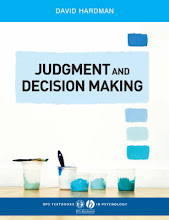Much recent research conducted by psychologists on the topic of moral judgment has examined the role of intuitions, specifically emotion-driven intuitions, as drivers of judgment. Reasoning is hypothesised to play little role in moral judgement, except to rationalise what has already been decided. But what about people who study ethics for a living? Do they learn to behave in a more ethical fashion?
Philosophers such as Aristotle, Kant, and Mill believed that a lifetime of studying ethics would have an improving effect, a view that has been echoed by many contemporary philosophers. However, Eric Schwitzgebel - Professor of Philosophy at the University of California, Riverside - has pointed out that this assumption has not been empirically tested. Moreover, when he questioned philosophers at a conference he found that most of them did not believe that ethicists behaved any better on average than non-ethicists. Some philosophers also shared their impression that more books on ethics went missing from the library shelves than other types of philosophy books.
Professor Schwitzgebel decided to put this to the test. First, with the help of an independent coder he identified 126 ethics titles and 149 non-ethics philosophy titles published since 1985 (based on their appearance in Philosophical Review). This list excluded any titles that were likely to appeal to a non-specialist readership. Next, during the autumn term of 2006 he examined the status of those books in the online catalogue systems of 13 American libraries and 19 British libraries. When considered as a percentage off-shelf, there were more ethics books missing (8.5%) than non-ethics books (5.7%), a difference which was statistically significant. Ethics books were borrowed about as often as non-ethics books, ruling out one possible alternative reason for the results. Ethics books tended to be very slightly newer than non-ethics books, ruling out the possibility that the higher rate of missing ethics books was because they had been available for a longer period. Further analyses ruled out the possibility that the effect was driven by law professors or by unusual patterns at specific libraries.
In a follow-up study, Schwitzgebel examined library data for classic volumes published prior to 1900. Due to catalogue problems with the British libraries, this analysis was confined to the same American libraries used in the first study. Again, ethics books were compared against non-ethics books, but this time a third category was included - the works of Nietzsche (who condemned conventional morality). As a percentage of off-shelf books, significantly more ethics books were missing (16.7%) than non-ethics books (8.4%). 19.5% of the Nietzsche books were missing, significantly more than for non-ethics books, but not ethics books. In this study there were also more ethics books off the shelves than there were non-ethics books, but correcting for this factor 12 of the 13 libraries were missing a greater proportion of ethics books than expected. A comparison of mid-term and between-term checkout rates suggested that the results were probably not explainable in terms of undergraduate - as opposed to professorial - checkouts.
Professor Schwitzgebel considers a number of potential confounds in these studies (e.g. ethics books take longer to read...), but concludes that there is no a priori or empirical reason to accept any of them. In pondering the implications, he concludes that "It would be a dark day for moral philosophy if it turned out that philosophical moral cognition is generally harmful". Rather, he suggests that explicit moral cognition might be bivalent: in some circumstances it promotes good behaviour, but in other circumstances it rationalizes bad.
Reference
Schwitzgebel, E. (2009). Do ethicists steal more books? Philosophical Psychology, 22 (6), 711-725.
Thursday, 21 January 2010
Friday, 19 June 2009
Sleeping on a complex decision may be a bad choice - life - 19 June 2009 - New Scientist
Further evidence against the idea that unconscious thinking benefits decision making:
Sleeping on a complex decision may be a bad choice - life - 19 June 2009 - New Scientist
Shared via AddThis
Sleeping on a complex decision may be a bad choice - life - 19 June 2009 - New Scientist
Shared via AddThis
Tuesday, 16 June 2009
Can the Unconscious Outperform the Conscious Mind?
The link below is to a posting at PsyBlog, which summarises some studies that failed to find the benefits of unconscious thinking that were reported by Dijksterhuis and colleagues.
Can the Unconscious Outperform the Conscious Mind?
Can the Unconscious Outperform the Conscious Mind?
Labels:
blink,
conscious,
Dijksterhuis,
reflection,
unconscious
Subscribe to:
Posts (Atom)
About Google Analytics
This website uses Google Analytics, a web analytics service provided by Google, Inc. (“Google”). Google Analytics uses “cookies”, which are text files placed on your computer, to help the website analyze how users use the site. The information generated by the cookie about your use of the website (including your IP address) will be transmitted to and stored by Google on servers in the United States . Google will use this information for the purpose of evaluating your use of the website, compiling reports on website activity for website operators and providing other services relating to website activity and internet usage. Google may also transfer this information to third parties where required to do so by law, or where such third parties process the information on Google's behalf. Google will not associate your IP address with any other data held by Google. You may refuse the use of cookies by selecting the appropriate settings on your browser, however please note that if you do this you may not be able to use the full functionality of this website. By using this website, you consent to the processing of data about you by Google in the manner and for the purposes set out above.



